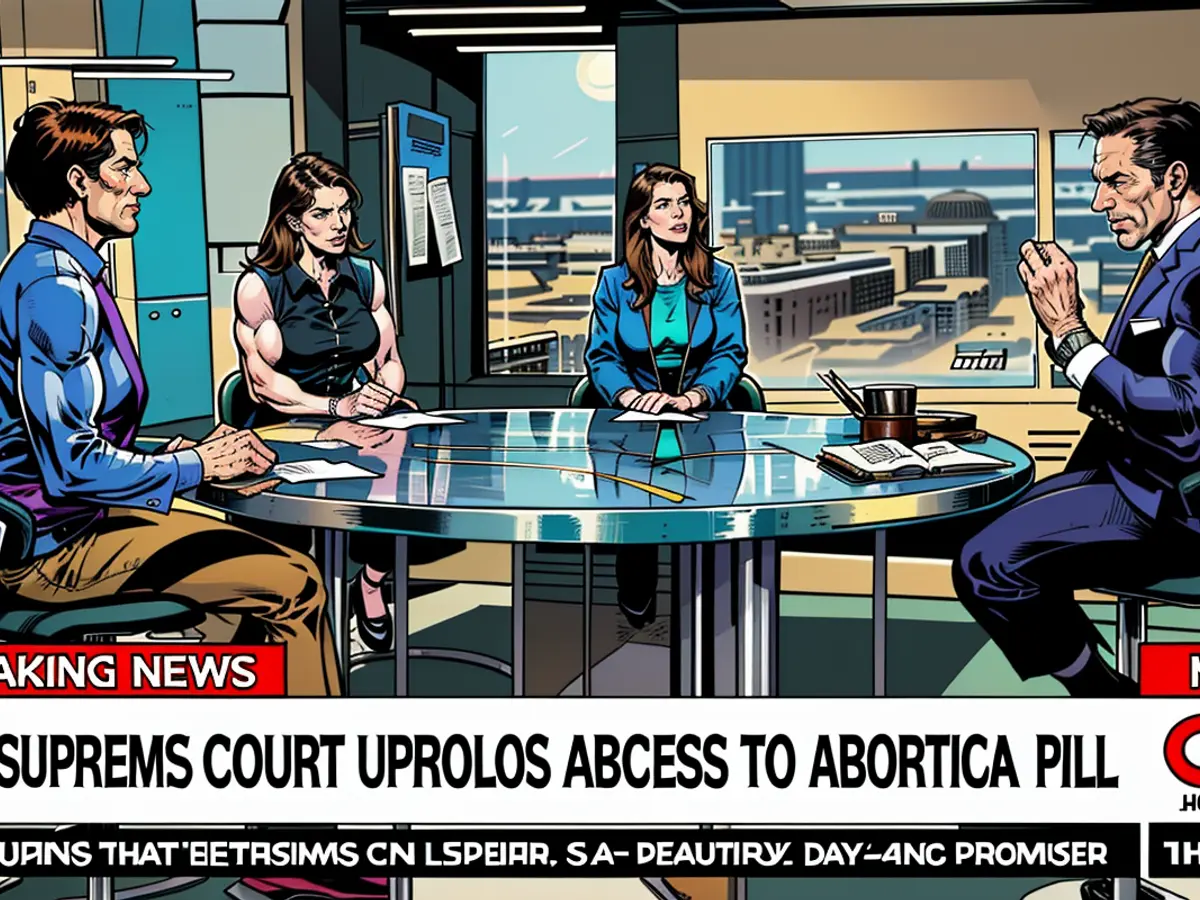Conservative jurisdictions initiate fresh battle to restrict mifepristone abortion medication availability, disregarding Supreme Court judgement.
The states of Missouri, Kansas, and Idaho filed an updated lawsuit in a federal court in Texas, appealing to Judge Matthew Kacsmaryk to undo the Food and Drug Administration's (FDA) measures over the past eight years that have made mifepristone more accessible, such as allowing it to be delivered via mail. This legal action could potentially bring the matter of mifepristone access back before the Supreme Court in the forthcoming presidency, putting the drug's nationwide availability at risk even in states where abortion is legal, and during a time when many states have imposed stiff restrictions on in-clinic abortions.
The states asserted in the revised lawsuit that dangerous drugs like mifepristone are inundating states like Missouri and Idaho, causing an increase in emergency room visits for women. However, this allegation has been debunked by mainstream medical organizations. Medication abortions account for about two-thirds of all abortions in the U.S.
In addition to challenging the FDA's approval of a generic version of the drug and eliminating in-person doctor visits and prescriber requirements, the new lawsuit also targets the FDA's authorization of mifepristone distribution via mail.
The lawsuit was lodged on a Friday. The states are not only contesting the ability to send mifepristone via mail, but they are also opposing the FDA's approval of a generic version of the drug, as well as the elimination of mandated follow-up doctor visits and requirements for physicians to be the prescribers.
The case has landed in a conservative federal court, as abortion has become a hot-button issue in the upcoming election between former President Donald Trump and Vice President Kamala Harris. During the CNN presidential debate in June, Trump backed the Supreme Court's decision regarding the drug, stating, "The Supreme Court just approved the abortion pill, and I agree with their decision to have done that. I will not block it." But later, during a summer news conference, Trump failed to rule out interference with the drug's availability.
Vice President Harris has been more forthright in her support for the FDA's approval and efforts to expand access to the drug. She has frequently accused her opponent of planning to restrict access to the drug.
A decision in the case could have far-reaching consequences at a time when the country is still dealing with the aftermath of the Supreme Court's 2022 decision to overturn Roe v. Wade, the 1973 case that established a constitutional right to abortion. The court's ruling prompted many states to impose bans or limitations on abortion, making the availability of abortion pills a high-priority issue for conservatives and a major concern for reproductive rights groups.
Legal challenge
The renewed legal push is a result of a technical ruling handed down by the Supreme Court earlier this year. The court unanimously ruled that the original lawsuit, filed by doctors and anti-abortion groups, lacked the authority to sue because they were not directly harmed by the FDA's expanded access to the drug.
The states, who previously intervened in the case, were initially blocked from participating in the Supreme Court proceeding. However, they pledged to revise the original lawsuit and try again. It remains unclear if the states will even be permitted to bring the lawsuit before Kacsmaryk, given that the Supreme Court overturned lower court decisions in the underlying case.
Led by Missouri Attorney General Andrew Bailey, a Republican, the states maintain they have the right to sue as the FDA's actions allegedly facilitate violations of state abortion laws "by enabling an out-of-state abortion drug distribution network." The states also claimed that the FDA's actions undermined state laws governing abortions for minors in foster care.
The states raised similar claims to those made by the initial anti-abortion groups, including an argument that mailing the drugs violates a 150-year-old federal law prohibiting the shipping of contraceptives and explicit material via the US Postal Service.
The doctors and medical organizations who took legal action against the FDA initially sought to prohibit mifepristone from the market altogether. Kacsmaryk, a Trump appointee, initially ruled to invalidate the FDA's approval of mifepristone, a move that would have eliminated the drug from the market. However, this ruling was never enforced.
The conservative 5th US Circuit Court of Appeals upheld the drug's original approval. However, the appeals court sided with the doctors who challenged the FDA's subsequent decisions expanding access to the drug, including mail delivery. Those lower court rulings were never implemented due to Supreme Court intervention, which ordered the status quo to remain in place until the case was reviewed.
Justice Brett Kavanaugh, a Trump nominee, wrote the unanimous Supreme Court decision in favor of the anti-abortion groups, stating, "We recognize that many citizens, including the plaintiff doctors here, have genuine concerns about and objections to others using mifepristone and obtaining abortions. However, citizens and doctors do not have the authority to sue simply because others are permitted to engage in certain activities – at least without the plaintiffs demonstrating how they would be directly harmed by the government's alleged under-regulation of others."
In the context of politics, this legal challenge against the FDA's approval and distribution of mifepristone could potentially become a contentious issue in the forthcoming presidency, as the Supreme Court's decision on the drug's availability might impact voting agendas.
The states involved in the lawsuit argue that politics play a role in their right to challenge the FDA's actions, as they believe the FDA's measures violate their state's abortion laws and facilitate out-of-state distribution networks.










